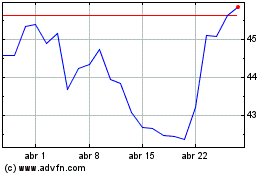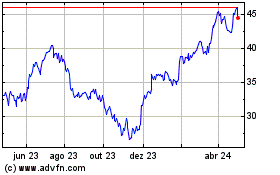Dow Jones Drops More Than 500 Points After US Hits Key Trading Partners With Tariffs
03 Fevereiro 2025 - 1:05PM
IH Market News
U.S. stocks started February lower after President Donald Trump
imposed tariffs on several key U.S. trading partners, raising fears
that a full-blown trade war would disrupt global supply chains,
reignite inflation and slow the economy.
The Dow Jones (DOWI:DJI) opened Monday’s trading session down
more than 500 points (-1.20%) at the opening bell. The S&P 500
(SPI:SP500) fell 1.5%, and the Nasdaq Composite (NASDAQI:COMPX)
fell 1.9%.
President Donald Trump on Saturday slapped a 25% tariff on goods
from Mexico and Canada. He also put a 10% tariff on imports from
China. Canadian energy imports received a smaller 10% tariff.
Canada responded with retaliatory tariffs of its own, while Mexico
said it would explore tariffs on U.S. imports. China, meanwhile,
said it would file a lawsuit with the World Trade Organization.
Trump also signaled over the weekend that tariffs on the
European Union would be imposed next.
“While the direct impact on U.S. growth from the announced
tariffs is still quite modest, the risk is that these policy
changes will amplify concerns about future trade policy risks and
potential retaliation,” Goldman’s Dominic Wilson wrote in a note
Sunday. “Stocks could also challenge market confidence that the
Administration will avoid policies that push growth down or
inflation up.”
U.S. automakers with large supply chains in North America led
the decline, with General Motors Corp (NYSE:GM) down 7% and Ford
Motor Co (NYSE:F) down 4% in premarket trading. Suppliers including
Aptiv Corp (NYSE:APTV) lost 5%, and engine maker Cummins Corp
(NYSE:CMI) lost 2%.
Nike (NYSE:NKE) fell 2%, while apparel maker (NASDAQ:LULU)
Lululemon lost 3%.
One of the positive groups was steelmakers, with Nucor
(NYSE:NUE) gaining 2% and Steel Dynamics (NASDAQ:STLD) up 1% in
premarket trading.
“Markets may now need to take the rest of Trump’s tariff agenda
literally rather than just seriously,” Tobin Marcus, head of U.S.
policy and politics at Wolfe Research, said in a note. “If this new
level of seriousness is suddenly priced in, Monday could be a tough
day for markets.”
The emerging trade war comes as investors are grappling with the
longest stretch yet for fourth-quarter earnings reports and a key
economic reading on the jobs market this week. More than 120
companies in the S&P 500 are set to report results, including
tech names Alphabet, Amazon and Palantir, as well as consumer
giants including Walt Disney and Mondelez. January payrolls are due
out on Friday, with economists surveyed by Dow Jones expecting
175,000 jobs to have been added last month.
Stocks are coming off a volatile few weeks to start 2025 as
investors grapple with constant headlines of a new White House
administration and cracks in the artificial intelligence trade that
led the market higher. All three major U.S. indexes ended Friday’s
trading session in the red, but traders still closed the first
month of the year with gains. The S&P 500 added 2.7% and the
tech-heavy Nasdaq Composite added 1.6% in January, while the Dow
Jones Industrial Average outperformed in the period, jumping
4.7%.
General Motors (NYSE:GM)
Gráfico Histórico do Ativo
De Jan 2025 até Fev 2025

General Motors (NYSE:GM)
Gráfico Histórico do Ativo
De Fev 2024 até Fev 2025
